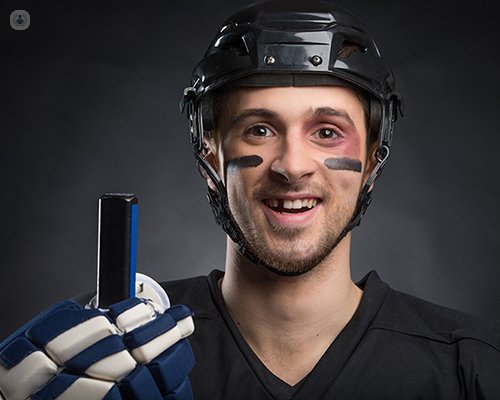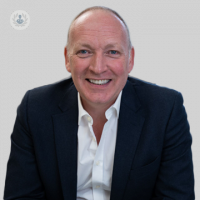All you need to know about oral reconstructive surgery
Written by:
Oral Reconstructive Surgery is surgery to rebuild the tissues of the mouth, jaws and face. This includes the skin of the face, the bone of the jaw, the muscle of the tongue, and the soft tissues in the cheeks, the palate, and the floor of the mouth. These are very complex structures and are extremely important for the normal function of speech, swallowing, eating and also for having well-supported teeth.

How are these structures rebuilt?
The rebuilding of these structures is very complex and relies on many different techniques including using the patient’s own tissues and artificial tissues. Sometimes it can be necessary to undertake only a very small amount of reconstruction, for example putting a dental implant in, or it can be a very large surgery such as transplanting bone from the leg after a large tumour resection.
As an oral reconstructive surgeon, Mr Luke Cascarini carries out the full range of these surgeries.
Why is oral reconstructive surgery necessary?
Oral reconstructive surgery can be required for a very large range of reasons; from something very simple such as a tooth infection, which causes the bone of the jaw to be lost requiring bone grafting in preparation for implant placement, to more extensive problems such as jaw, lip or tongue cancer, which can require a resection of quite an extensive part of the mouth and jaw. This would often require reconstruction involving free flap surgery; where tissue is transplanted from one region of the body to another. This involves complex microsurgical techniques.
If the jaw joint is damaged either through an accident, a tumour or arthritis, then detailed CT scans are employed to recreate an artificial joint using 3D printing and computer design. The artificial joint can then be implanted and used to restore better function to the jaw. This is one of the latest technologies in all reconstructive surgery.
What are the methods of oral reconstructive surgery?
Oral reconstruction uses a very wide range of techniques;
One fairly simple technique is bone grafting to rebuild part of the jaw for a dental implant. The patient’s own bone may be used or artificial bone or demineralised bone matrix are available.
More extensive types of surgery include free flap surgery, where tissue is transplanted from elsewhere in the body. This can be bone, skin or muscle or a combination.
These are completely removed from one part of the body and anastomosed using microsurgery to restore the blood supply to the tissues.
Implants such as jaw joints or cheek bones can be built using the latest technological developments in scanning and computer design. These are manufactured using the unaffected side as a template, and a millimetre-perfect implant is created using computer design.
How long does it take to recover from oral reconstructive surgery?
The post-op stage in all reconstructive surgery depends very much on the extent of the surgery. Simple reconstruction, such as bone grafting, sinus lift, or dental implants can be done as a day case procedure, and the recovery time is minimal.
More extensive surgery can require a prolonged stay in hospital, with some period of extensive care and anywhere between 5 and 15 days in the hospital.
The patient will undergo intense rehabilitation from different members of a team including speech and language therapists, physiotherapists, and dieticians to help relearn the normal function in the tissues that have been reconstructed.


